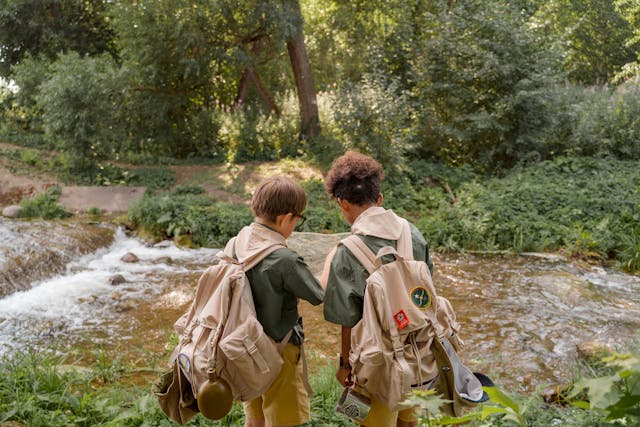Have you ever thought about how much your child can gain just by spending a night under the stars? Camping isn’t just about sleeping in tents or roasting marshmallows—it’s a life-changing adventure that helps children learn, grow, and connect with nature.
Talking about the benefits of Camping for kids is that it promotes the physical strength, confidence level and a good knowledge about the nature for well-being. And the bond between the family members will be more strong and also reduce stress, distractions from the screens and daily busy schedule.
Whether you’re a parent in Kathmandu, Pokhara, or anywhere around the world, introducing your child to camping can be one of the best gifts you give. Let’s dive into the awesome benefits of camping for kids—explained in the simplest, most fun way!
Benefits of Camping for Kids
1. Kids Connect with Nature

These days, kids are glued to screens. Camping helps them disconnect from gadgets and reconnect with nature. From spotting birds to collecting leaves, it builds curiosity and appreciation for the world around them.
“Mom, look! A butterfly!” – that kind of joy is priceless!
Nepal has wonderful camping spots like Chitwan National Park, Nagarkot, and Rara Lake—perfect for families with kids.
2. It Boosts Problem-Solving and Thinking Skills
Pitching a tent, building a fire (with adult help!), or figuring out how to cook outdoors—camping teaches real-world skills. It encourages creative thinking and independence.
“Let’s figure this out together!” – You’ll be surprised how smart your kid is.
3. Physical Fitness and Active Play
From hiking trails to swimming in lakes, camping gets your kids moving! No more lazy weekends. It’s all about running, exploring, and playing—all while soaking up that fresh mountain air.
Plus, they sleep better after all that activity!
4. Builds Family Bonds
Let’s face it—camping is quality time, without distractions. Sitting around a campfire, telling stories, cooking meals—these shared moments create memories that last a lifetime.
SEO Keyword Tips Integrated:
- family camping benefits
- camping with kids Nepal
- outdoor activities for children
5. Reduces Stress and Anxiety
Yes, even kids feel stress—from school pressure, social media, or city noise. Camping offers a calm, natural escape where they can just breathe, be free, and feel relaxed.
Nature has a way of healing, for both kids and adults.
6. Teaches Responsibility
Carrying their own backpack, keeping their things organized in the tent, helping with meals—camping gives kids small responsibilities that boost self-reliance and discipline.
Other Benefits of Camping for Kids
| Benefit | Description | Why It Matters |
|---|---|---|
| Improves Physical Health | Kids stay active through hiking, swimming, and outdoor games. | Encourages fitness and reduces screen time. |
| Boosts Mental Well-being | Nature reduces stress and improves mood. | Promotes emotional resilience and mindfulness. |
| Enhances Social Skills | Interacting with peers builds teamwork and communication. | Helps kids develop friendships and cooperation. |
| Develops Independence | Kids learn to manage without constant parental supervision. | Builds confidence and decision-making skills. |
| Encourages Curiosity | Exposure to nature sparks interest in animals, plants, and ecosystems. | Inspires learning beyond the classroom. |
| Promotes Problem-Solving | Setting up tents or navigating trails builds practical thinking. | Encourages critical thinking and adaptability. |
| Fosters Family Bonding | Shared activities strengthen parent-child relationships. | Creates lifelong memories and emotional connection. |
| Reduces Screen Addiction | Time away from gadgets helps reset digital habits. | Supports healthier tech balance in kids’ daily lives. |
| Teaches Survival Skills | Kids learn basics like cooking, starting a fire, or reading maps. | Builds confidence and basic outdoor competencies. |
| Cultivates Respect for Nature | Camping fosters environmental awareness and responsibility. | Helps kids become eco-conscious future citizens. |
Bonus: Less Screen Time, More Real Life
One of the best things? Camping gives kids a break from screens. It helps them enjoy the real world—stars, rivers, mountains, bugs, and stories!
Where to Camp with Kids in Nepal?
| Camping Spot | Location | Family-Friendly Activities |
|---|---|---|
| Nagarkot | Bhaktapur | Short hikes, sunrise view |
| Chitwan | Terai | Jungle safari, canoeing |
| Rara Lake | Mugu | Lake sightseeing, fishing |
| Kakani | Nuwakot | Picnic spots, scenic walk |
Looking for a weekend getaway near Kathmandu? These places are safe, peaceful, and full of adventure for your little ones.
Final Thoughts
Camping is more than just fun—it’s a powerful tool for child development. From improving health to building confidence and connection with nature, the benefits of camping for kids are truly endless.
So, ready to pack your tent and hit the trail with your little adventurers?
FAQs
Why is camping important for children?
Camping teaches kids life skills, boosts mental and physical health, reduces stress, and helps them connect with nature.
What age is best for kids to start camping?
Kids as young as 3–4 years can start camping with parents in safe, family-friendly environments.
What should kids pack for camping?
Clothes, water bottle, flashlight, sleeping bag, snacks, and a favorite toy or book.
What are the advantages of camping?
Camping offers several advantages, including:
- Connection with Nature: Experience the outdoors, fresh air, and scenic beauty.
- Stress Relief: Being in nature reduces stress and promotes mental relaxation.
- Physical Activity: Activities like hiking, fishing, and setting up tents boost physical fitness.
- Family Bonding: Camping provides quality time with family and friends away from digital distractions.
- Improved Sleep Patterns: Exposure to natural light resets your internal body clock.
- Learning Survival Skills: Teaches essential skills like fire-making, cooking outdoors, and navigation.
How important is camping?
Camping is important for both physical and mental well-being. It encourages a simpler lifestyle, helps people disconnect from technology, and promotes mindfulness. For children, it builds confidence and independence. Overall, camping fosters a sense of environmental awareness and appreciation for nature.
What is a camp and why is it important?
A camp is a temporary outdoor shelter where people stay for recreational, educational, or survival purposes. Camping is important because it:
- Encourages outdoor learning and adventure.
- Strengthens teamwork and leadership skills.
- Promotes mental relaxation and creativity.
- Instills self-reliance and problem-solving abilities.
What are the benefits of camping? (Essay Format)
Camping is an enriching activity that combines adventure, learning, and relaxation. It helps individuals break free from the hustle of urban life and reconnect with nature. The benefits of camping include mental detoxification, physical fitness through outdoor activities, and valuable life skills like teamwork and survival tactics. Moreover, it nurtures a deep environmental consciousness. Families and friends bond over campfires, storytelling, and shared adventures, making camping a cherished experience. In an era dominated by screens and fast-paced living, camping offers a wholesome escape and rejuvenation.
What is so special about camping?
Camping is special because it provides a unique blend of adventure, simplicity, and connection with nature. The experience of sleeping under the stars, cooking over an open fire, and enjoying serene landscapes creates lasting memories. Unlike other vacations, camping emphasizes self-sufficiency, creativity, and minimalism, which is refreshing in today’s fast-paced world.
What is the most useful thing for camping?
The most useful thing for camping is a multi-functional camping gear set, which typically includes:
- Tent with rain cover for shelter.
- Sleeping bag and mat for comfort.
- Portable stove or cooking set for meals.
- Headlamp or flashlight for night visibility.
- First aid kit for emergencies.
Among these, a high-quality tent is considered the most crucial as it provides protection from weather and wildlife, ensuring a safe and comfortable camping experience.

